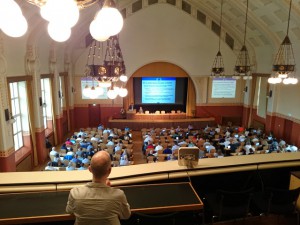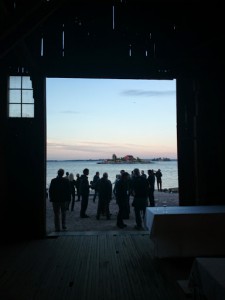
We’ve returned home after a fulsome week in Helsinki, attending the Open Repositories 2014 Conference along with approximately five hundred delegates & sponsors. The conference is a leading international event in the Open Access calendar, focusing on post-publication OA: curation, preservation and dissemination of scholarly research, and, data about scholarly research. Open Repository was one of a number of conference sponsors. We’d like to thank our hosts for their excellent hospitality, and for looking after us fabulously.
Advocacy
Erin McKiernan gave a typically forthright keynote address. As with her address to the SPARC 2014 meeting in Kansas City, she made another compelling case for researchers to be completely Open Access in publishing, and, to share open research data via institutional repositories or data repository services such as Dryad, FigShare, BioMed Central’s own GigaScience, or CERN’s Invenio project. These are but a few examples of emergent data storage, visualisation and sharing services for researchers, operating in an increasingly crowded field.
Technology
We were excited by a number of projects and initiatives in the repository and preservation sphere. Of particular interest were presentations and workshops relating to the curation of institutional research data, common identifier standards, and the development of features enabling greater cross-platform interoperability. As usual there seems to be an element of duplication of effort between different repository platforms when working to make features and initiatives such as ORCID work in repositories. This was reflected in discussions to find ways to mitigate this problem.
DSpace Future: Food for thought
As a hosted repository service using the open-source DSpace platform, we came away from the DSpace sessions in the conference with mixed-feelings about the current & future status of the platform, both in terms of technology and governance. As we consider what will comprise the future Open Repository platform technology for our clients, we still have good faith in this particular open-source platform as a solid offering for our clients. However, we plan to set out some our of ‘DSpace thoughts’ in a separate post, with the expectation that DSpace’s platform curator DuraSpace will address them over the next six months.
What can Open Access take from Open Repositories 2014?
‘Repositories’ -institutional, data, metadata, subject content or preservation- are no longer ‘a place where research goes to die’ The web of interactive, interoperable platforms is enhancing and improving global scientific and other scholarly research. The energy and enthusiasm of those working to achieve this within the Open Access realm, make for an informative and engaging conference.
James Evans (Product Manager)
Artur Konczak (Senior-Lead Developer)
Twitter : @openrepository

Comments